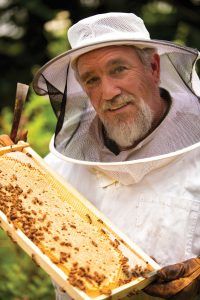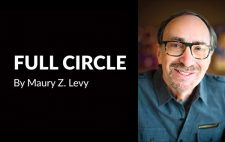Picture a produce aisle with no blueberries, strawberries, cranberries, almonds or apples. Imagine a future where you can’t buy pumpkins, squash or cucumbers in any grocery store. SJ’s beekeepers know this fruitless future is a very real threat; so they’re working hard to keep the bees alive.
“The rule of thumb is that one-third of everything on your plate is there because of honeybees,” says Ned Morgan, president of the South Jersey branch of the New Jersey Beekeepers Association. “These plants, and so many more, are entirely dependent on bees for pollination.”
For the last several decades, bees around the world have been in trouble. Wild, or feral, hives have become rare, Morgan says, due to a mysterious blight called colony collapse disorder.
“Wild hives have been on a steep decline for some time. I wish there was a simple explanation for why a bee colony collapses, but there isn’t,” Morgan says. “It’s tied to lack of habitat, lack of good food, pesticides and parasites.”
The most common of these parasites is the Varroa destructor, a mite that reproduces inside a beehive, spreading disease and feeding on the bees’ blood.
“The Varroa feeds on the blood or lymph of the honeybees from the time they hatch into a young larva into their adult life,” Morgan says. “That’s one of the biggest reasons you don’t find feral honeybee hives anymore. The mite was introduced to America in the ’80s, and since that introduction we’ve experienced the greatest loss of bees ever.”
Morgan, who has kept bees for nearly a decade at his Deerfield Township home, says there is no foolproof treatment for parasites like the Varroa mite.
“There are miticides for it, but they’re not absolute, and the problem is you’re trying to kill a bug on a bug,” he says. “The mites are building resistance to some of the earlier miticides we used. We’ve seen a lot of that, and that’s one of the reasons there’s so much work being done now in research and education.”
Morgan and his wife, Doris, play a big role in bee education. The couple speaks to groups of children and adults about the importance of bees and recently gave a workshop titled “The Status of Honeybees” at the Rutgers Agricultural Research and Extension Center. In addition, the Morgans are co-leaders of the Cumberland County 4-H Wannabes Club, where kids ages 9 to 19 learn about beekeeping.

Backyard beekeeper Tom O’Keefe
In nearby Gloucester County, the 20 or so young members of the 4-H Foragers Bee Club meet once a month to check on their bees with leader and backyard beekeeper Tom O’Keefe.
O’Keefe, who has nine hives in his Glassboro backyard, just steps from the heart of Rowan University’s main campus, says people are often surprised to hear he’s housing almost half a million bees in such a densely populated area.
“I don’t think people realize you don’t need acres and acres to have beehives,” says O’Keefe, 61. “You can have bees in a residential area; you just have to be smart about it. You have to have a water source, or they’ll be headed to your neighbor’s pool. And speaking of neighbors, you should let them know their flowers are going to look great, and their garden is going to grow like crazy.”
The number of hobbyist beekeepers in the state is on the rise. Membership in the New Jersey Beekeepers Association has grown from 450 members in 2007 to nearly 1,200 this year. Many, like O’Keefe, work with local farmers to pollinate crops. These side jobs bring most backyard beekeepers a few extra dollars, but for commercial beekeepers, pollination is their main source of income.
“There are migratory beekeepers moving hives all over the U.S.,” Morgan explains. “Some of these beekeepers go up and down the East Coast pollinating crops. It takes about 1,100 beehives to pollinate New Jersey’s blueberries, so the migratory beekeepers bring their hives here, and then they move all the way up to Maine for their blueberries. When the blueberries end in Maine, they come back down the coast and do pumpkins, cucumbers and apples. In the fall they wind up in Florida pollinating citrus.”
O’Keefe says the migratory beekeeping industry owes its existence to a Philadelphia native. In 1851, Reverend Lorenzo Langstroth discovered that when his bees had exactly 3/8 inch of space to move around, they would not seal that space with wax honeycomb.
“He called it ‘bee space,’” O’Keefe says. “That’s how much space they need to get in and out, and move around inside the hive. He used that measurement to design the movable frame hive; a hive that could be taken apart and the honey harvested, without destroying the entire hive and forcing the bees to start from scratch. Without this invention, the migratory industry simply wouldn’t exist, and it would be much, much more difficult to be a backyard beekeeper.”
While beekeeping, both hobbyist and commercial, is a major industry in the state, there are no state laws governing the practice. Assemblyman Ron Dancer (R- Plumsted Township) saw a gap in legislation that had individual municipalities passing widely varied beekeeping ordinances.
“There are 566 municipalities in the state, and each one was beginning to try to adopt ordinances setting beekeeping standards, and in some cases totally banning bees from their municipalities,” Dancer says. “When I saw this piecemeal approach, I sensed the need to have statewide, uniform standards for all beekeepers that would not only protect the public, but also preserve the bee colonies, which are so essential.”
Dancer sponsored a package of bills that sailed through the State Assembly with broad bipartisan support. They are expected to pass the Senate this fall. The bills extend the state’s “Right to Farm Act” to commercial beekeepers, protecting them from nuisance complaints and insuring they are governed by officials who have knowledge of the bee industry. Other aspects of the legislative package establish best practices for residential beekeepers, including a requirement that hives are placed a minimum distance of 25 feet from public sidewalks and property lines.
“This legislation will heighten public awareness, provide protections and set standards to preserve the bee colonies,” Dancer says. “I saw this need to educate the public and public officials about how important these bees are to our economy. Without bees, there will be no more gardens in the Garden State.”
While a bee’s primary job is pollination, beekeepers are also happy to collect the fruits of the hive’s labor: rich, sweet honey.
“Bees have been around for 40 million years,” Morgan says. “Man has been going after honeybees for their honey since the cave era. Someone told me there are cave paintings in France depicting early man getting honey out of hives.”
Morgan says honey is the ideal sweetener, as it’s easy to digest and packed with vitamins and nutrients.
“It really is a super food,” Morgan says. “It never goes bad in a sealed container because nothing can grow in it. It sucks the moisture right out of bacterial cells. It’s easier to digest for most people because the disaccharide sucrose – like regular table sugar – has already been broken down into the monosaccharides fructose and glucose. I have a customer who runs marathons and uses my honey as an energy source.”
Anthony Grelli, whose Sewell hives pollinate nearby Duffield’s Farm, says his customers buy honey to suppress their seasonal allergies.
“There’s no scientific evidence proving it works,” says Grelli, 51. “But I have customers who swear by it. A lot of them come and get it not just for their allergies but for their colds, too. Some people use it for wounds, abrasions and things like that because it is an antiseptic.”
Grelli keeps 40 hives at Duffield’s and another 30 in a field of weeds in Deptford. His annual honey yield is about 600 pounds, but he says he’s not really in it for the money.
“Anytime you have a hobby it takes your mind off the stressful things in life,” Grelli says. “You can set up a chair and watch the bees come in and out, and it’s very relaxing. When I have a stressful day I come home and go out to the bee yard. When you see them come in loaded with pollen, and you know they’re going in to feed the hive, build up their home, make honey, and you had something to do with that – it’s a great feeling.”
Grelli, who owns a lawn care company, says his customers are getting used to the idea of sharing their yard with bees.
“People are looking to get back into nature, and they want to help the bees because they know there’s a problem,” he says. “When I was a kid you would walk through your yard and there were bees all over the place. You don’t see them like that now. But the bees are coming back. Commercial and hobbyist beekeepers are putting more bees out there, and I’m starting to see them in places they haven’t been in the past. I’m out working on a lawn and I’m seeing bees, even though I know there’s no backyard beekeepers in the area.”
Grelli believes the comeback of the honeybee depends heavily on education. Many people, he says, confuse honeybees with other, more menacing bee species. Grelli says he frequently gets called to examine a beehive, only to arrive and discover a hornet or wasps’ nest.
“There’s a negative connotation in people’s minds because of these other stinging insects,” he says. “But folks need to understand that a honeybee doesn’t want to sting us. If she stings us, she’s going to die because her barbed stinger stays in your skin. They only sting to defend their hive, unlike a wasp or a hornet, who will sting you over and over just because they can.”
Grelli believes the resurgence of the honeybee will require SJ residents to adopt new habits. While he encourages everyone to become a backyard beekeeper, he says there’s a lot the average homeowner can do to encourage local bee populations.
“You can help by planting bee-friendly plants and colorful, pollen-rich flower gardens,” Grelli says. “You’re promoting a friendly habitat for the bees, and providing a food source even if you don’t have a hive. Everyone should have some type of garden that attracts pollinators.”
If you care about the bees, Grelli says, when it comes to lawn care, less is more.
“A lot more of my customers are starting to be at ease with not having a perfect lawn,” he says. “It’s nice to have curb appeal, but I tell everyone, ‘mow the front, mow the sides; leave the backyard for the bees.’”












